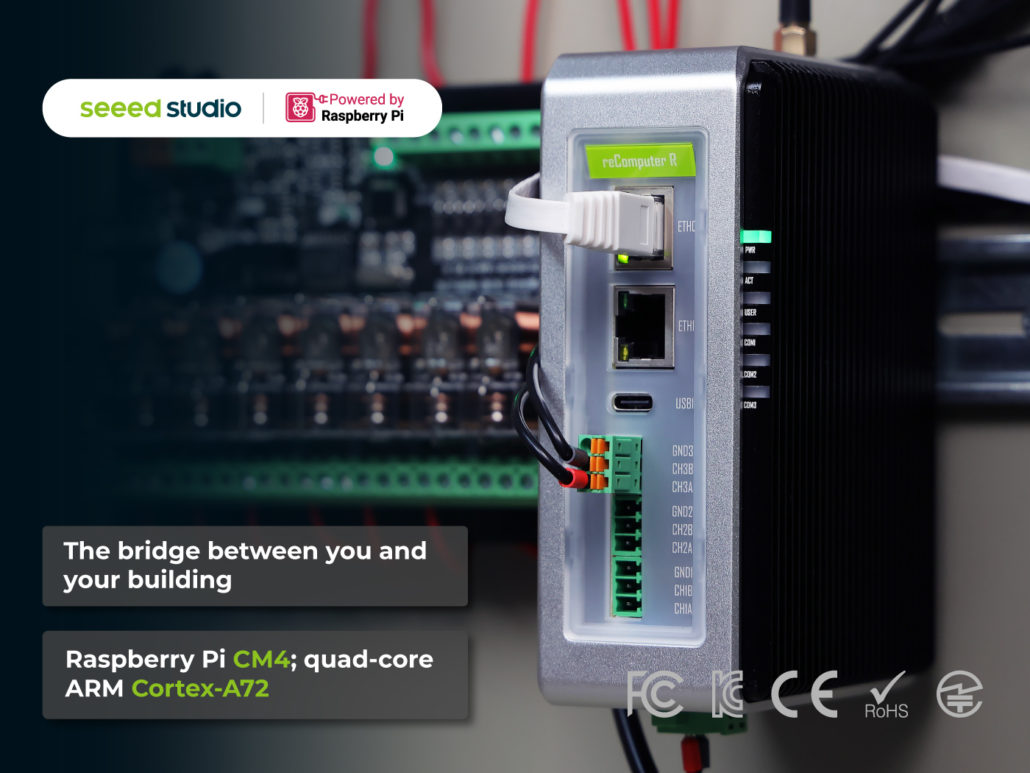Artifical Intelligence
AI is all the rage currently, with generative AI taking the world by storm since the release of OpenAI’s ChatGPT in November 30, 2022.
This breakthrough sparked a wave of innovation, leading to the release of numerous Large Language Models (LLMs) from various companies. Most recently, Claude’s Sonnet 3.5 joined the AI landscape on June 20, 2024, further expanding the ecosystem of both cloud-based and open-source local models.
The potential of these generative AI models seems almost limitless. They excel not only in producing human-like responses to an vast array of queries but also in creating captivating content across multiple mediums, such as images, videos and music, reshaping how we approach content creation. In addition, generative AI is now invaluable in technical fields, offering significant assistance in coding tasks and accelerating research processes.
About Raspberry Pi
Raspberry Pi is a series of compact and affordable single-board computers that have revolutionized the world of DIY computing and education.
The release of the Raspberry Pi 5 in October 2023 marked a significant leap forward, opening up new possibilities and projects for AI enthusiasts with its substantial improvements in speed and performance.
While previous Raspberry Pi models can handle some AI tasks, they may not be able to keep up with the computational demands of modern AI and machine learning algorithms. For those AI enthusiasts, we strongly recommend investing in the Raspberry Pi 5 to ensure a smooth and fast performance.
In this article, we’ll explore the top 6 Raspberry Pi AI projects that you can try in 2025.
Top 6 Raspberry Pi AI Projects in 2025
01. Raspberry Pi in Computer Vision Using OpenCV
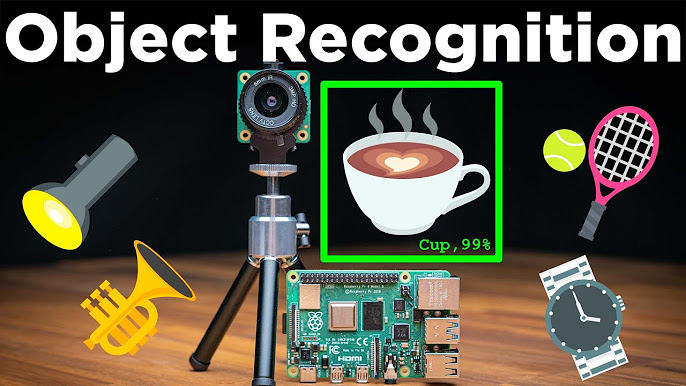
Image source: Core Electronics Youtube Channel
AI is not just about LLMs and chatbots. Computer vision is a field of AI that has been present long before LLM and uses machine learning and neural networks for object detection, image classification. facial recognition and much more!
In fact, computer vision is the fundamental technology for self-driving vehicles.
You can follow this detailed guide to help set up your Raspberry Pi with OpenCV and get started experimenting with some basic computer vision!
Items you may require
- Official camera module for Raspberry Pi, built for AI applications.
- Latest generation Raspberry Pi 5 model for enhanced performance
Additional Video Guide
- View Core Electronics youtube playlist, which showcases many easy to follow tutorials on computer vision with raspberry Pi.
02. Raspberry Pi Voice-Controlled AI Assistant
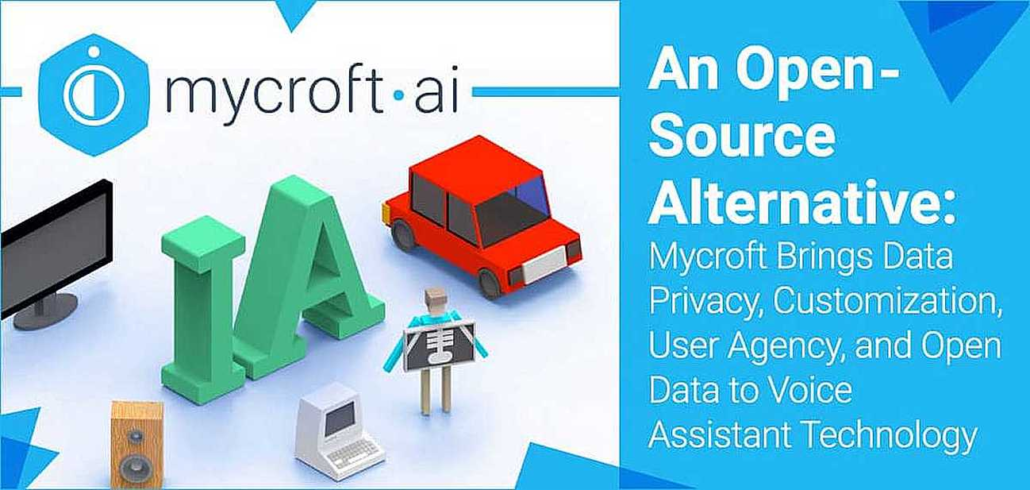
Image source: HostingAdvice.com
A cornerstone of any smart home or an intelligent workspace is a voice assistant, allowing you to control smart devices or retrieve information just by using voice commands. This project uses Mycroft specifically, an open sourced voice assistant which keeps your data local and secure.
This is ideal for those who values their privacy and may not trust existing cloud based alternatives such as Amazon’s Alexa or Google Assistant. Furthermore, you do not require internet connection for this local voice assistant, perfect for scenarios where connectivity is unavailable or unreliable.
Start on this project now by following this step-by-step tutorial!
Items you may require
- Raspberry Pi
- Microphone designed specifically for AI & voice applications
Additional Video Guide
- You can also view this detailed video tutorial on youtube on how to set up Mycroft on your Raspberry Pi!
03. Using Raspberry Pi for Real Time Object Detection

Image source: Ultralytics official website
Take your computer vision projects to the next level with real-time object detection and tracking using YOLOv8 on your Raspberry Pi. YOLO (You Only Look Once) is a state-of-the-art, computer vision system, and its latest iteration, YOLOv8, brings about improved speed and accuracy.
Running YOLOv8 on a Raspberry Pi will demonstrate how edge computing can bring powerful AI capabilities to compact, energy-efficient devices. This setup is perfect for scenarios where low latency is crucial, or if you prefer to process data locally for privacy reasons.
Get started on this exciting project by following this comprehensive guide on deploying YOLOv8 to your Raspberry Pi!
Items you may require
- Latest generation Raspberry Pi 5 model for enhanced performance
- Official camera module for Raspberry Pi, built for AI applications.
- A simple cooling fan to maintain performance during intensive tasks
Additional Video Guide
- For a visual walkthrough, check out this detailed video tutorial on YouTube that shows you how to set up and run YOLOv8 on your Raspberry Pi.
04. Using Pi 5 to Build a Delivery Robot
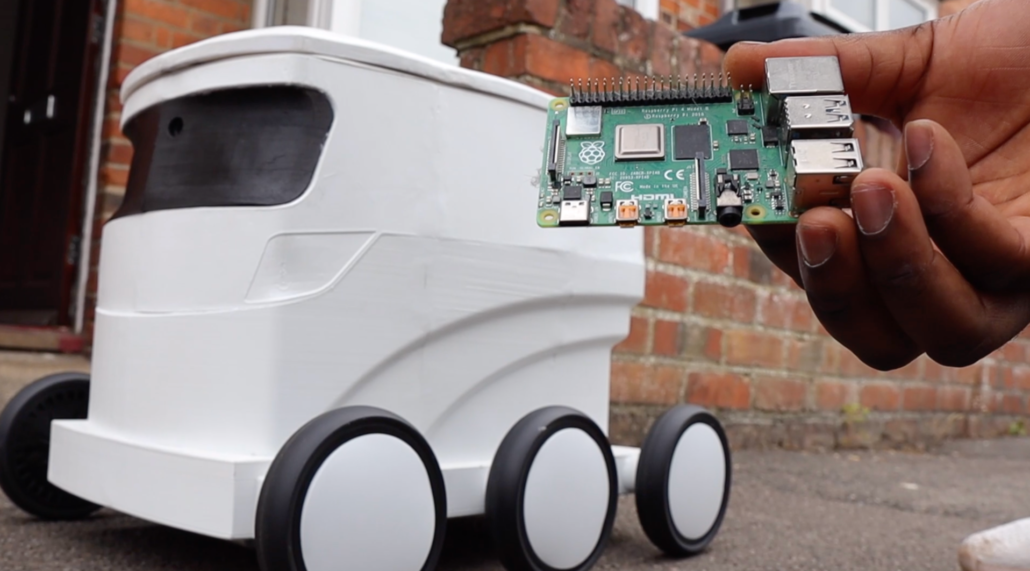
Image source: smartbuilds.io
This is a very fun and exciting project, where you can build your own delivery robot powered by a Raspberry Pi 5. This project combines varous aspects of AI, including computer vision, path planning, and object detection in order to create a functional autonomous delivery system.
This is ideal for those who are interested in robotics as well as AI, offering hands-on experience with technologies that are shaping the future of logistics and last-mile delivery. We have linked this detailed step-by-step guide for you that covers both the hardware and software aspect of the robot to help you get started on this project!
Items you may require
- Latest generation Raspberry Pi 5 model for enhanced performance
- Official camera module for Raspberry Pi, built for AI applications.
Additional Video Guide
- This youtube video showcases the delivery robot in action and offers a visual guide on assembling the robot.
05. Using Raspberry Pi to run ChatGPT
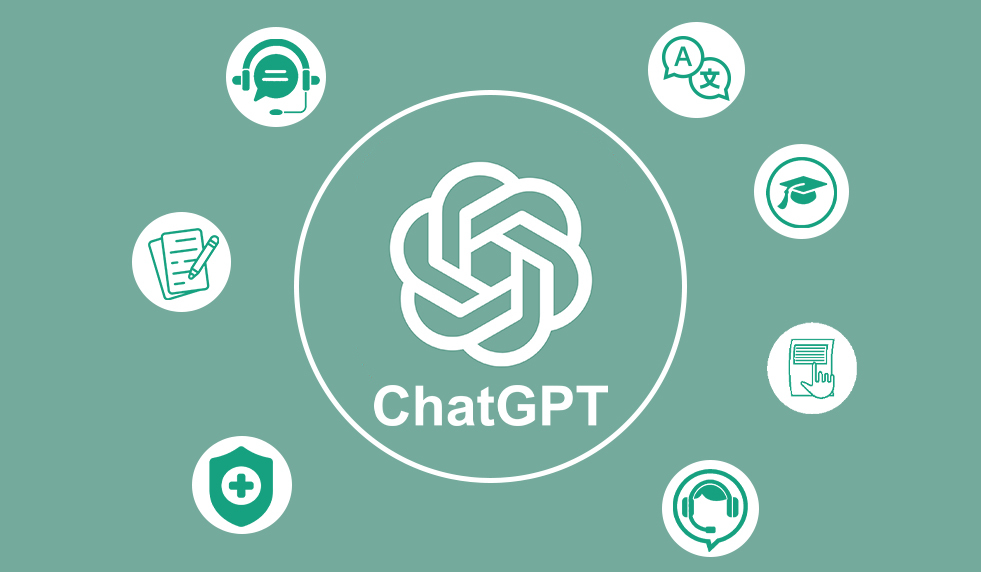
Image Source: Eaton Business School
Large Language Models (LLMs) like ChatGPT have become an integral part of many people’s daily lives, assisting with various tasks from writing to coding.
This simple project allows you to run a version of LLM that is very similar to ChatGPT through making API calls with a python library, perfect to get you started on integrating this with other more advanced projects!
Here is a simple step-by-step guide for you to follow and set up ChatGPT on your Raspberry Pi.
Items you may require
- Latest generation Raspberry Pi 5 model for enhanced performance
06. AI Surveillance Using Raspberry Pi 5 with Frigate NVR
Frigate NVR is an open-source network video recorder designed for real-time object detection with AI models. Paired with the Raspberry Pi 5, it enables cost efficient video surveillance at the edge.
Follow this step by step guide to learn how to install Frigate NVR on Raspberry Pi.
Items you may require
- reComputer AI R2130-12 – all-in-one edge AI machine based around the Raspberry Pi 5 single-board computer and the Hailo-8 machine learning accelerator provide up to 26 TOPS performance
Additional Video Guide
This demonstration will showcase how a Hailo-8 powered Raspberry Pi 5 can transform your AI surveillance capabilities.
Additional Materials
While the Raspberry Pi boards and especially the latest generation, Pi 5, are undoubtedly powerful computing units, AI tasks can be particularly resource-intensive. To maximize your AI project capabilities and efficiency, consider supplementing your setup with these additional materials. These enhancements can significantly boost performance, expand functionality, and open up new possibilities for your AI experiments.
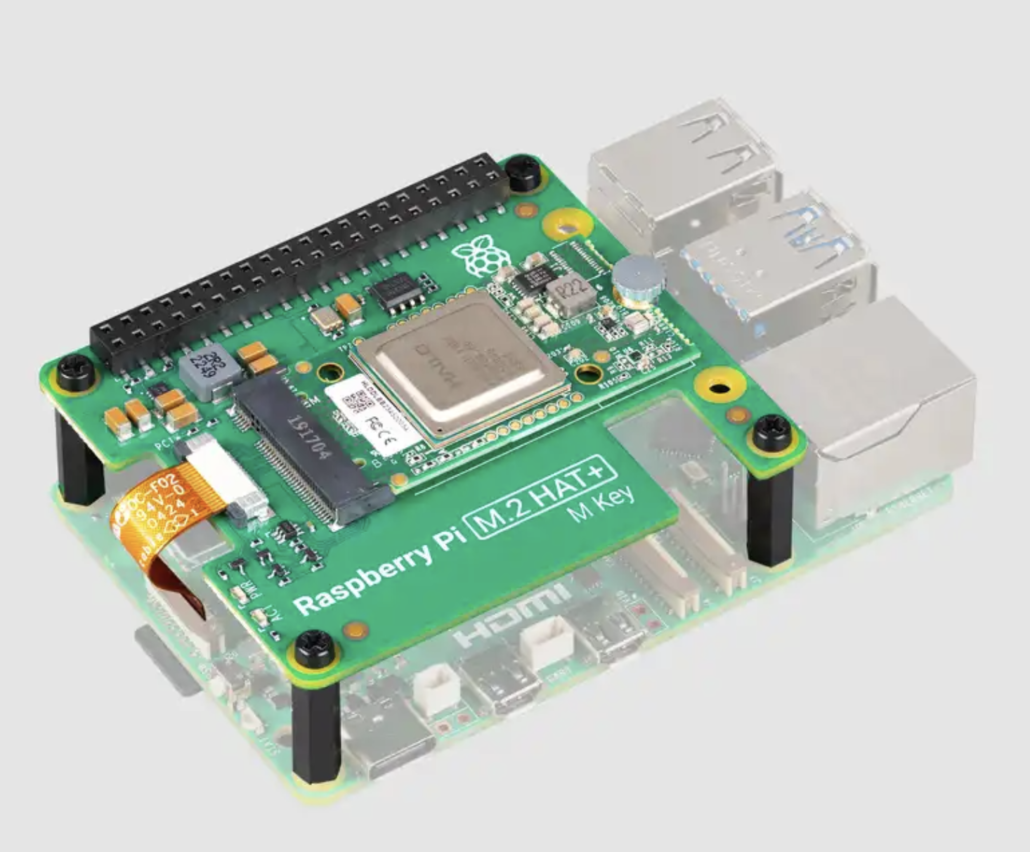
The Raspberry Pi AI Kit is an essential bundle for anyone looking to dive into AI projects with their Raspberry Pi. This comprehensive kit includes:
- A Hailo AI module containing a Neural Processing Unit (NPU)
- A Raspberry Pi M.2 HAT+, to connect the AI module to your Raspberry Pi 5
- A thermal pad pre-fitted between the module and the M.2 HAT+
- A mounting hardware kit
- A 16mm stacking GPIO header
The AI module is a 13 tera-operations per second (TOPS) neural network inference accelerator built around the Hailo-8L chip. The module uses the M.2 2242 form factor, and comes pre-installed in the M.2 HAT+, to which it connects through an M key edge connector.
This kit provides an accessible, cost-effective, and powerful way to integrate high-performance AI capababilities with your Pi 5.
Google Coral
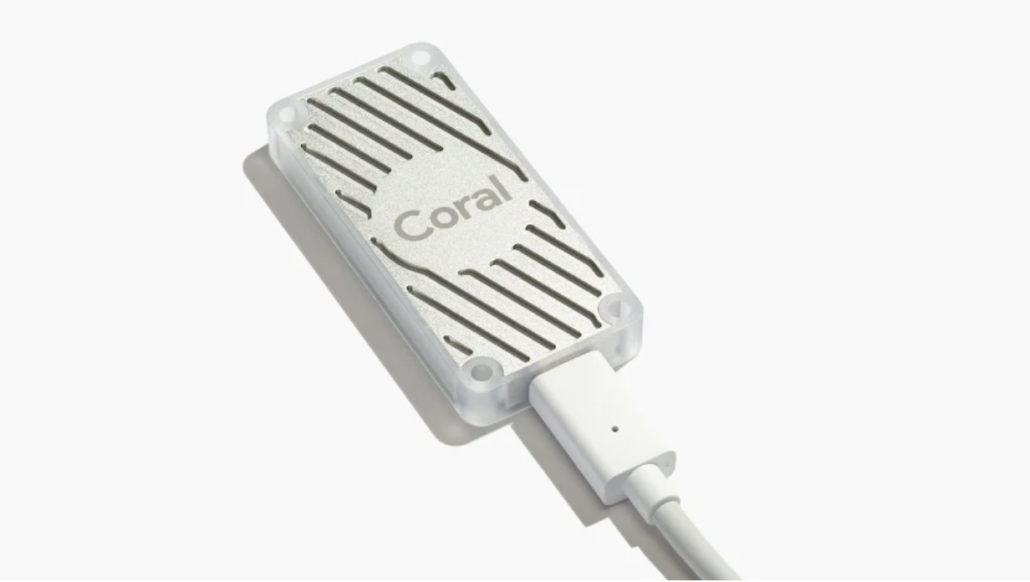
reComputer R1000 is an open and powerful Raspberry Pi Edge AIoT gateway & controller.
With 3*RS485, dual-ethernets, BACnet, and Modbus support, equipped with all the necessary features that a robust and reliable industrial edge device needs, it’s a perfect fit for remote access control, especially BMS, BAS, and iBMS.
With the native M.2 slot there, the reComputer R1000 supports seamless installation of this latest Raspberry Pi AI kit. One simple step can transform it into a powerful AI box, boosting its AI capabilities to 13 TOPS with low power consumption though, making it perfectly suited for edge AI applications.
Explore how Seeed’s engineers benchmark and deploy YOLOv8 on this reComputer R1000 equipped with the Raspberry Pi AI kit though these cool wikis.
Conclusion
As we’ve explored these top Raspberry Pi AI projects for 2025, we at SeeedStudio hope that at least one of those projects will be of interest to you! AI has taken center stage in the tech world, and the new Pi 5’s enhanced capabilities has opened up many new possibilites in the world of artificial intelligence and machine learning. From running local Large Language Models to building smart delivery robots, these projects demonstrate the versatility and power of this compact yet mighty device.
If you do not possess a Raspberry Pi yet, get one today and get started on your first project now! You can also explore the broad range of free courses offered at the Raspberry Pi website regarding AI and machine learning.
For those more experienced users who are looking to explore advanced AI projects, get started now with the Raspberry Pi AI Kit or the Google Coral USB Accelerator!
 Raspberry Pi Community Buzz: Exploring Raspberry Pi AI Kit vs. Google Coral – FPS, Temperature, Consumption, and Pricing. Plus, the potential to be unlocked when we switch to PCIe Gen3.0 from PCIe Gen2.0 on Pi 5?
Raspberry Pi Community Buzz: Exploring Raspberry Pi AI Kit vs. Google Coral – FPS, Temperature, Consumption, and Pricing. Plus, the potential to be unlocked when we switch to PCIe Gen3.0 from PCIe Gen2.0 on Pi 5?
 Unleash the Power of M.2: What Can an M.2 Hat for Raspberry Pi Unlock? Super-fast storage and AI accelerator brings us unlimited imagination about Raspberry Pi’s role in 3D Printing, Home Assistant, NVR, Pi Home Server, Pi Multimedia Center, NAS, Robotics, and More!
Unleash the Power of M.2: What Can an M.2 Hat for Raspberry Pi Unlock? Super-fast storage and AI accelerator brings us unlimited imagination about Raspberry Pi’s role in 3D Printing, Home Assistant, NVR, Pi Home Server, Pi Multimedia Center, NAS, Robotics, and More!
Benchmark demos, and real-world apps, are all covered! Let’s explore the emerging possibilities in Raspberry Pi AI together!
Update: AI Boosted RPi for Real World Applications

In this latest livestream about Raspberry Pi AI, we will address the very questions raised by our users in the previous two live streams featuring the reComputer R1000 and RPi M.2 Hat.
In the upcoming part two, gear up for an exclusive feature showcase of Seeed Studio RPi AI Box, freshly unveiled and powered by 13T NPU acceleration. It’s poised to bring AI capability into digital signage, POS systems, and thin client solutions. 
Following this, get ready for a signage demonstration built on the reTerminal DM, integrated with the RPi AI kit. But wait, there’s more — brace yourself for a spectacular surprise at the grand finale!
